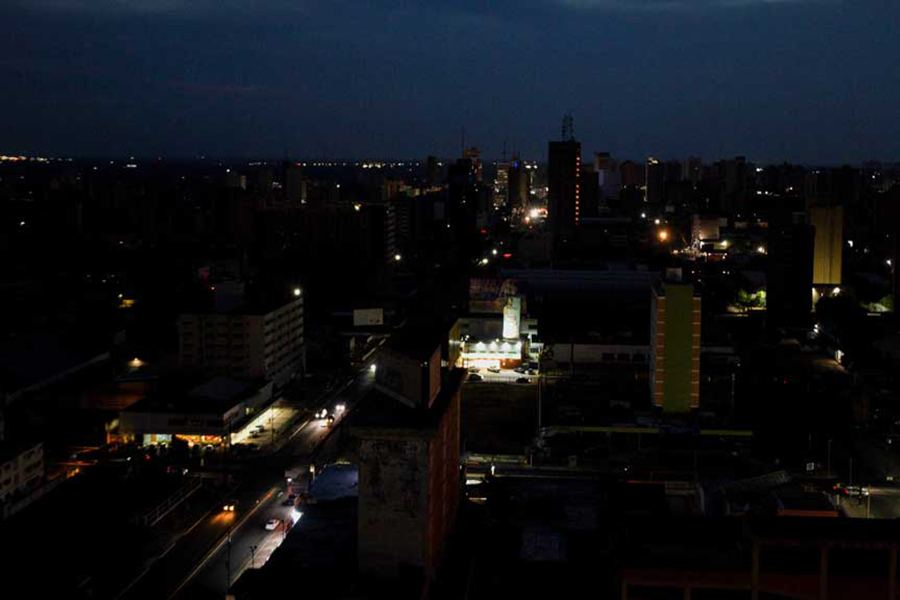
Published :
Updated :

Power had returned to some parts of Venezuela on Friday evening after capital Caracas and much of the rest of the country were plunged into a blackout that the government blamed on sabotage by the opposition, without providing evidence.
President Nicolas Maduro, who is locked in a dispute with the opposition over the outcome of a Jul 28 presidential election, has often held his political rivals responsible for what he says are "attacks" on the power grid, accusations the opposition has always denied.
The blackout was the result of an attack on the Guri Reservoir, Venezuela's largest hydroelectric project, Maduro said on state television on Friday evening, as he blamed the opposition and what he said were fascists in the United States.
Maduro offered no evidence for his claims, but said the attack had been focused on transmission lines.
A rapid investigation was taking place, he added.
"I won't say more because it is being investigated," Maduro said, adding that it was an attack of significant magnitude.
Authorities had prevented an attack on election day and another planned for Friday night, Maduro added.
Venezuela last suffered national blackouts in 2019, with some lasting as long as three days.
Authorities also attributed those power outages to attacks on the network and on Guri by saboteurs and opponents of Maduro's government.
"We are normalising, regularising, step-by-step... We are better prepared and in better conditions than in 2019," Maduro said.
All 24 of the country's states reported a total or partial loss of electricity supply, Freddy Nanez, the minister of communication and information, said on state television early on Friday morning, blaming "sabotage".
By about 1pm local time (1600 GMT), power had returned to some parts of western city Maracaibo, central city Valencia, eastern city Puerto Ordaz and capital Caracas, according to Reuters witnesses.
In other places power was intermittent or remained off.
The blackout hit some operations of state oil company PDVSA, including its largest terminal, Jose, where vessel loading and discharging was interrupted by the outage, according to sources and a shipping document seen by Reuters. A key oil upgrader that produces exportable crude, Petropiar, was also affected.
About 70% of Venezuela's oil exports are handled through Jose, which does not have its own power system. Most of US firm Chevron's Venezuelan crude exports go out from Petropiar.
PDVSA's largest refining complex Paraguana was unaffected, as its own power plant was in service, the sources said, and the impact was minimal in Orinoco Belt as many operations have their own generators.
QUICK REACTION
In the western city of Barquisimeto, residents stocked up on gasoline and food in the afternoon.
Lawyer Alexa Rivas, 29, avoided what she said were five kilometer (three mile)-long lines at urban gas stations by driving to a service station outside the city.
"I can't be without gasoline, I have a 3-year-old boy and my mom is 70, I need to have reserves for any emergency," she said. "We've lived through two national blackouts, it makes us very nervous."
Critics have long blamed power cuts on deteriorating infrastructure amid the country's fiscal woes. Senior opposition figure Juan Pablo Guanipa scoffed at the sabotage accusations on Friday.
"This narrative isn't believed by even the most radical Chavistas," Guanipa said on X, referring to loyalists of the ruling socialists.
Venezuela's government and opposition both say their candidate won last month's election, with the electoral authority and Supreme Court backing Maduro. Authorities have not released full vote tallies despite international calls to do so.
Arrests of opposition figures have risen sharply over the last week.
The opposition's former presidential candidate Edmundo Gonzalez and opposition leader Maria Corina Machado are being investigated for incitement and other crimes by Attorney General Tarek Saab.
Gonzalez has ignored two summons to testify about a website where the opposition has posted what it says is more than 80% of ballot box vote tallies, which show a resounding win for him.
Gonzalez was cited for a third time on Friday but did not apparently testify. Asked what would happen next in the case, Saab said in a text message: "We'll see."


 For all latest news, follow The Financial Express Google News channel.
For all latest news, follow The Financial Express Google News channel.